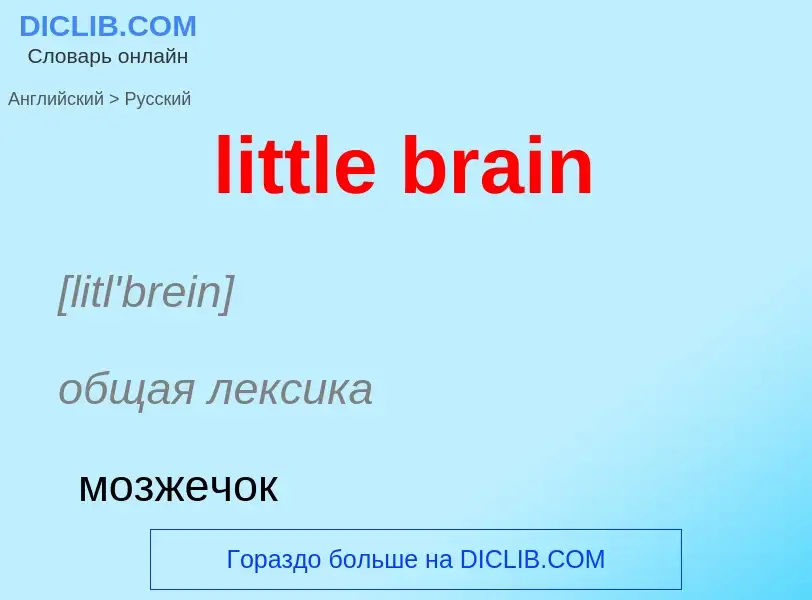Vertaling en analyse van woorden door kunstmatige intelligentie ChatGPT
Op deze pagina kunt u een gedetailleerde analyse krijgen van een woord of zin, geproduceerd met behulp van de beste kunstmatige intelligentietechnologie tot nu toe:
- hoe het woord wordt gebruikt
- gebruiksfrequentie
- het wordt vaker gebruikt in mondelinge of schriftelijke toespraken
- opties voor woordvertaling
- Gebruiksvoorbeelden (meerdere zinnen met vertaling)
- etymologie
little brain - vertaling naar russisch
[litl'brein]
общая лексика
мозжечок
[brein]
общая лексика
головной мозг
интеллект
ум
медицина
мозг
Смотрите также
существительное
[brein]
общая лексика
головной мозг
мозги (кушанье)
обыкн. [разг.] рассудок
разум
умственные способности
интеллект
ум
разговорное выражение
умник
умница
«голова»
мыслящая личность (a brain)
профессионализм
киносценарист
автор литературного сценария
электронный мозг (ЭВМ)
глагол
общая лексика
размозжить голову
Definitie
Цыпленок, курица.
2. м. и ж. разг.-сниж.
Чрезмерно изнеженный человек.
Wikipedia

A brain is an organ that serves as the center of the nervous system in all vertebrate and most invertebrate animals. It is located in the head, usually close to the sensory organs for senses such as vision. It is the most complex organ in a vertebrate's body. In a human, the cerebral cortex contains approximately 14–16 billion neurons, and the estimated number of neurons in the cerebellum is 55–70 billion. Each neuron is connected by synapses to several thousand other neurons. These neurons typically communicate with one another by means of long fibers called axons, which carry trains of signal pulses called action potentials to distant parts of the brain or body targeting specific recipient cells.
Physiologically, brains exert centralized control over a body's other organs. They act on the rest of the body both by generating patterns of muscle activity and by driving the secretion of chemicals called hormones. This centralized control allows rapid and coordinated responses to changes in the environment. Some basic types of responsiveness such as reflexes can be mediated by the spinal cord or peripheral ganglia, but sophisticated purposeful control of behavior based on complex sensory input requires the information integrating capabilities of a centralized brain.
The operations of individual brain cells are now understood in considerable detail but the way they cooperate in ensembles of millions is yet to be solved. Recent models in modern neuroscience treat the brain as a biological computer, very different in mechanism from an electronic computer, but similar in the sense that it acquires information from the surrounding world, stores it, and processes it in a variety of ways.
This article compares the properties of brains across the entire range of animal species, with the greatest attention to vertebrates. It deals with the human brain insofar as it shares the properties of other brains. The ways in which the human brain differs from other brains are covered in the human brain article. Several topics that might be covered here are instead covered there because much more can be said about them in a human context. The most important that are covered in the human brain article are brain disease and the effects of brain damage.


![[[Andreas Vesalius]]' ''Fabrica'', published in 1543, showing the base of the human brain, including [[optic chiasm]]a, cerebellum, [[olfactory bulb]]s, etc. [[Andreas Vesalius]]' ''Fabrica'', published in 1543, showing the base of the human brain, including [[optic chiasm]]a, cerebellum, [[olfactory bulb]]s, etc.](https://commons.wikimedia.org/wiki/Special:FilePath/1543, Andreas Vesalius' Fabrica, Base Of The Brain.jpg?width=200)

.jpg?width=200)
![Neurons generate electrical signals that travel along their axons. When a pulse of electricity reaches a junction called a [[synapse]], it causes a neurotransmitter chemical to be released, which binds to receptors on other cells and thereby alters their electrical activity. Neurons generate electrical signals that travel along their axons. When a pulse of electricity reaches a junction called a [[synapse]], it causes a neurotransmitter chemical to be released, which binds to receptors on other cells and thereby alters their electrical activity.](https://commons.wikimedia.org/wiki/Special:FilePath/Chemical synapse schema cropped.jpg?width=200)
![''[[Gulai otak]]'', [[beef brain]] curry from Indonesia ''[[Gulai otak]]'', [[beef brain]] curry from Indonesia](https://commons.wikimedia.org/wiki/Special:FilePath/Gulai Otak.jpg?width=200)
![Diagram of signal processing in the [[auditory system]] Diagram of signal processing in the [[auditory system]]](https://commons.wikimedia.org/wiki/Special:FilePath/Hearing mechanics cropped.jpg?width=200)
![The [[Human Brain Project]] is a large scientific research project, starting in 2013, which aims to simulate the complete human brain. The [[Human Brain Project]] is a large scientific research project, starting in 2013, which aims to simulate the complete human brain.](https://commons.wikimedia.org/wiki/Special:FilePath/Henry Markram - Visualizing Synaptic Maps onto Neocrortical Neurons.jpg?width=200)
![Cross-section of a human head, showing location of the [[hypothalamus]] Cross-section of a human head, showing location of the [[hypothalamus]]](https://commons.wikimedia.org/wiki/Special:FilePath/LocationOfHypothalamus.jpg?width=200)
![Model of a neural circuit in the cerebellum, as proposed by [[James S. Albus]] Model of a neural circuit in the cerebellum, as proposed by [[James S. Albus]]](https://commons.wikimedia.org/wiki/Special:FilePath/Model of Cerebellar Perceptron.jpg?width=200)
![Drawing by [[Santiago Ramón y Cajal]] of two types of Golgi-stained neurons from the cerebellum of a pigeon Drawing by [[Santiago Ramón y Cajal]] of two types of Golgi-stained neurons from the cerebellum of a pigeon](https://commons.wikimedia.org/wiki/Special:FilePath/PurkinjeCell.jpg?width=200)

![epileptic seizure]] epileptic seizure]]](https://commons.wikimedia.org/wiki/Special:FilePath/Spike-waves.png?width=200)
